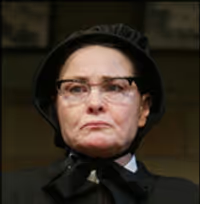The case of Elton John on Broadway
Theatrefanboy1
Broadway Legend Joined: 8/2/15
#1The case of Elton John on Broadway
Posted: 11/27/24 at 3:44pm
While I confess I think he’s one of the greatest songwriters over the last century. I am truly perplexed by the range it which his theatre works have survived or died on Broadway. While he has some of the biggest hits over the last 30 years (the lion king, AIDA, Billy Elliot). He’s also now had almost as many flops (LESTAT, Tammy)
im curious what the message board thinks of the downfalls of his strengths for the theatre. Because I do personally place him amongst the Menken, Webbers of theatre writing. But the range of success and failures I’ve found interesting (which not to say menken and Webber haven’t had their fair stinkers)
#2The case of Elton John on Broadway
Posted: 11/27/24 at 4:01pm
If he'd written five musical in ten years and had three mega-hits, we'd look at him like a steady bet. It's just the fact that he's written five musicals across thirty years and had two mega flops as well as the big hits that makes him stand out, since he appears on Broadway with such relative rarity.
#3The case of Elton John on Broadway
Posted: 11/27/24 at 4:07pm
I think that's very fair, darquegk. And "Devil Wears Prada" was actually (mostly) fixed and is now a hell of a lot of fun. I mean it's not the next "Follies" but I had a great time at the Dominion and am seeing it again in a couple weeks. It's also selling VERY VERY WELL and for a show to steadily sell out that barn is always impressive. So we very well might be able to add that show to his "hits".
#5The case of Elton John on Broadway
Posted: 11/27/24 at 4:17pm
Jordan Catalano said: "I think that's very fair, darquegk. And "Devil Wears Prada" was actually (mostly) fixed and is now a hell of alot of fun. I mean it's not the next "Follies" but I had a great time at the Dominion and am seeing it again in a couple weeks. It's also selling VERY VERY WELL and for a show to steadily sell out that barn is always impressive. So we very well might be able to add that show to his "hits"."
Interesting, I had heard the revamped DEVIL was no better than the previous iteration, and it seems like the score didn't change that much if at all.
#6The case of Elton John on Broadway
Posted: 11/27/24 at 4:21pm
The show is night and day compared to the Chicago run. It's been VASTLY improved and large portions have been removed and others rewritten with I believe 8 total songs that are either brand new or rewritten from their original versions. As someone who endured this in Chicago, I honestly couldn't believe the amount of work they did on this. Like I said, it's not a masterpiece but it's legit a hell of a fun night out.
#7The case of Elton John on Broadway
Posted: 11/27/24 at 4:26pm
I assume Vanessa is wonderful?
#8The case of Elton John on Broadway
Posted: 11/27/24 at 4:30pm
She really is. And the score was obviously revamped to custom suit her voice (as it is now) so she also sounds wonderful. It's really impressive because she has all the famous Meryl/Miranda lines but she changes up the delivery of them up juuuuust enough so that they're completely her own. It's truly impressive for her to be able to take an iconic role like that and not make you think of Meryl.
Updated On: 11/27/24 at 04:30 PM
DeNada
Broadway Star Joined: 7/7/07
#9The case of Elton John on Broadway
Posted: 11/27/24 at 5:00pm
Billy Elliot and Lestat were successes and failures in spite of Elton John, not because of him. The score is the weakest part of Billy and the strongest part of Lestat (which was a narrative mess).
Lion King is arguably such a mega hit because of Julie Taymor - John wrote virtually no new material for the stage show at all anyway.
I can't really comment on Aida; I was actually quite surprised to (re)discover that it turned a profit, and although I know the cast album well I've never seen the show. Different times? Effective stunt casting? I dunno.
pablitonizer
Leading Actor Joined: 4/8/21
#10The case of Elton John on Broadway
Posted: 11/27/24 at 5:00pm
Jordan Catalano said: "She really is. And the score was obviously revamped to customsuit her voice (as it is now) so she also sounds wonderful. It's really impressive because she has all the famous Meryl/Miranda lines but she changes up the delivery of them up juuuuust enough so that they're completely her own. It's truly impressive for her to be able to take aniconic role like that and not make you think of Meryl."
I only saw the Chicago tryout and it was a big hot mess. I read some reviews on this revamped version and the overall response is that it's super fun and pretty close to the movie, even script-wise. However, I feel that could be the biggest critique on Broadway (if it gets transfered). I don't think critics will be excited if the musical does not expand on what has already been established in the movie. Death becomes her has definitely improved what was given in the movie, but I'm not hearing Devil wears Prada is doing the same. I guess we'll see
#11The case of Elton John on Broadway
Posted: 11/27/24 at 5:30pm
All I know is that it is time for an Aida revival. Broadway, Off-Broadway, Regional, Encores! ...anywhere.
#12The case of Elton John on Broadway
Posted: 11/27/24 at 6:07pm
I think a lot of it has to do with material and collaborators. In the case of The Lion King, it sounds like he didn't really add much in terms of new material, he just had really strong collaborators. I think the same goes for Billy Elliot. I'll never think of it as a show I want to "listen" to. The direction and staging was just really fun and imaginative. Lestat - there's a couple really good songs? The young vampires thirst for blood song I loved - but I think the idea of singing Vampires just did not resonate. And I think the same thing happened with Tammy. I just think the subject matter feels very "ho-hum" and depressing and I'm not sure anyone is really in the mood for that right now which is why something like Death Becomes Her is seeing such success, I think.
#13The case of Elton John on Broadway
Posted: 11/27/24 at 9:53pm
I very much agree that a particular element of a musical is not always tethered to its success (or failure). Elton has written some great music (in and out of the theatre) but his reputation as a collaborator has not been great. I remember people saying, back in the time of Aida, that he was never around when you would have expected him to know he should be. That's not his way. It's hard to find a correlation between Elton and theatrical success along more than one axis.
#14The case of Elton John on Broadway
Posted: 11/27/24 at 10:44pm
Maybe it was just the press narrative at the time, but it seems to me that he felt more invested in / passionate about BILLY ELLIOT. But that show also had two other people driving it (Stephen Daldry & Lee Hall), who were also the forces behind the film, and the novelty element of dancin' kids.
At this point, every producer should know his working style: he'll provide some tunes and lend his name to the promotion. Expecting any more from him is foolish.
#15The case of Elton John on Broadway
Posted: 11/28/24 at 5:57am
Elton John IS a great songwriter, but I think it's no accident that 90% of his classic/great pop songs were collaborations with Bernie Taupin. And that brings up the issue of all the different lyricists he uses for his musicals. I haven't really thought this theory through to any degree, but my snap response is that the theatricality of his work is dependent on his collaborators and isn't inherent in his actual writing (even when he had success with the animated Lion King, I remember at the time many gave the credit for the impact of that score largely to the arrangements and Zimmer's work, although they didn't strike similar gold a few years later when John/Rice/Zimmer did the score for The Road to El Dorado.)
Theaterfanboy wrote:
" im curious what the message board thinks of the downfalls of his strengths for the theatre. Because I do personally place him amongst the Menken, Webbers of theatre writing. "
And we completely disagree here. Menken, and I have to admit mostly ALW, truly think dramatically/theatrically. Menken is especially well known for, at least in his prime, finding an overall dramatic "sound" for each of his scores (even when they're recognizably Menken) and I think ALW deserves more credit for doing this than he gets, even if especially lately he's been less successful at it. I don't really find that to be true of John--again I think it's usually left to his collaborators to try to give the scores thematic connections and heft, if that makes sense.
It is interesting that Lestat was his only show he did with Taupin. And as much as I love Taupin's pop lyrics, I don't think his style of writing lends itself really to musicals (although if they're gonna emulate anything, they aren't bad at capturing some of the floridness of Anne Rice's writing.) And actually, I think it's one of (if not THE) most interconnected and complex (or at least attempting to be complex) of John's musical scores.
As others have said, the score wasn't the issue with Lestat. It was trying to cram way too much material into a musical, and probably frankly using for book and direction, etc, people who were not up to the challenge (book writer Linda Woolverton has only two other Broadway credits, Beauty and the Beast and Aida, and director Robert Jess Roth and choreographer Matt West still only have Beauty and the Beast as their other Broadway credit... Because when you're doing a Vampire Chronicles musical your go-to people are the people who did the Beauty and the Beast stage adaptation?) Full disclosure, I saw Lestat in San Francisco and had a blast--and the friend I went with who hadn't seen the movie let alone read the books was *completely* lost after the first 15 minutes, and I heard it only got worse for Broadway. But yes, I want that stupid cast album!
*Anyway* as usual I think I've lost my point. But, certainly, I'd never call him a great musical composer, even if I think he HAS written great songs for musicals, if that makes any sense?
#16The case of Elton John on Broadway
Posted: 11/28/24 at 11:24am
Woolverton wrote Wicked also. Aida’s book is David Henry Hwang.
#17The case of Elton John on Broadway
Posted: 11/28/24 at 11:57am
darquegk said: "Woolverton wrote Wicked also. Aida’s book is David Henry Hwang."
Winnie Holzman is the sole credited bookwriter on WICKED. It's often been cited that Eve Ensler (of all people) took an uncredited pass at it.
#18The case of Elton John on Broadway
Posted: 11/28/24 at 3:19pm
A couple of quick notes:
Although in general, the Taupin-John relationship was definitely symbiotic, their only Broadway musical theatre collab was Lestat. Make of that what you will. That's in contrast to Menken, whose work has never been as good post-Ashman. (Perhaps the most manifest demonstration of that is Aladdin; the best songs were written with Ashman, before his death.)
Aida's book credit is not just Hwang but also Woolverton and its director (Falls). Make of that what you will too.
#19The case of Elton John on Broadway
Posted: 11/28/24 at 6:07pm
ErmengardeStopSniveling said: "darquegk said: "Woolverton wrote Wicked also. Aida’s book is David Henry Hwang."
Winnie Holzman is the sole credited bookwriter on WICKED. It's often been cited thatEve Ensler (of all people) took an uncredited pass at it."
My bad! I always get them confused.
#20The case of Elton John on Broadway
Posted: 11/28/24 at 6:11pm
darquegk said: "ErmengardeStopSniveling said: "darquegk said: "Woolverton wrote Wicked also. Aida’s book is David Henry Hwang."
Winnie Holzman is the sole credited bookwriter on WICKED. It's often been cited thatEve Ensler (of all people) took an uncredited pass at it."
My bad! I always get them confused."
I was gonna say ;)
As for Aida, I was being lazy and just looking at Woolverton's credits on ibdb. The official credits for Aida's book are: Book by Linda Woolverton, Robert Falls and David Henry Hwang, but, while I no longer remember the details of Aida's tumultuous journey to Broadway, I think Hwang did do the final draft (?)
#21The case of Elton John on Broadway
Posted: 11/28/24 at 6:16pm
HogansHero said: "A couple of quick notes:
Although in general, the Taupin-John relationship was definitely symbiotic, their only Broadway musical theatre collab was Lestat. Make of that what you will. That's in contrast to Menken, whose work has never been as good post-Ashman. (Perhaps the most manifest demonstration of that is Aladdin; the best songs were written with Ashman, before his death.)."
Right, in my rambling comment above, I tried to address that about Taupin only doing Lestat (which I still think is one of John's more distinct Broadway scores--which isn't the same as saying I think it's great, just that it does seem very much written sonically for the materially.) I haven't read Taupin's memoir and don't know if he addresses Lestat, but did hear him interviewed a lot when the book came out and I get the feeling he just doesn't have all that much interest in dramatic lyric writing--he tried it to try it and that was enough. (But I'm not sure how John's lyricists have been chosen--obviously he worked with Rice on El Dorado and Aida because they wanted to capture some of the Lion King success, and with Billy Elliot I'm sure Lee Hall who wrote the film script, and was writing the book, wanted to do the lyrics himself, but otherwise...)
I don't think anyone would argue that Menken did his best work with Ashman (more of a minority opinion but I'd even throw God Bless You Mr. Rosewater in among his best scores,) but, at least at his peak, Menken still tried to find a distinct sound for his individual projects (probably most obvious in the immediate post Ashman scores for Pocahontas and Hunchback) which is something that mostly John doesn't seem to do, which is why I wouldn't put him at all in the same category as a dramatic composer.
#22The case of Elton John on Broadway
Posted: 11/29/24 at 12:30am
EricMontreal22 said: "I haven't read Taupin's memoir and don't know if he addresses Lestat, but did hear him interviewed a lot when the book came out and I get the feeling he just doesn't have all that much interest in dramatic lyric writing--he tried it to try it and that was enough."
I certainly agree with this. It's lack of interest but also lack of the very different skill set that one needs. It reminds me of a talk I attended years ago (so long ago I don't remember who spoke). The speaker was a novelist, and someone asked him if he had ever written short stories. His answer was blunt (paraphrasing): "I don't know how. I've tried but I can't. I get to the end of the allotted number of words and I haven't said anything yet." Taupin's problem is basically the reverse.
I don't think anyone would argue that Menken did his best work with Ashman "
I think there is either an extra negative or an extra positive in the above. If not, then I am more confused than I give myself credit for being. :-)
#23The case of Elton John on Broadway
Posted: 11/29/24 at 4:04am
HogansHero said: "EricMontreal22 said: "Taupin's problem is basically the reverse.
"
I think that makes a lot of sense with Taupin's pop lyrics...
I don't think anyone would argue that Menken did his best work with Ashman "
I think there is either an extra negative or an extra positive in the above. If not, then I am more confused than I give myself credit for being. :-)"
Ha all that I meant was that I'm sure most (all?) Menken fans would agree with you that his best work is with Ashman (OK, I'm sure some will argue Hunchback, but...)
Owen22
Broadway Legend Joined: 2/24/11
#24The case of Elton John on Broadway
Posted: 11/29/24 at 6:21am
MAN IN CHAIR: Oh, Elton John. When shall the charade end?
#25The case of Elton John on Broadway
Posted: 11/29/24 at 10:57am
For me, I think there’s a lack of coherence in John’s musical theatre body of work that seems more indicative of a writer-for-hire than somebody driven by personal or artistic pursuit.
Videos









